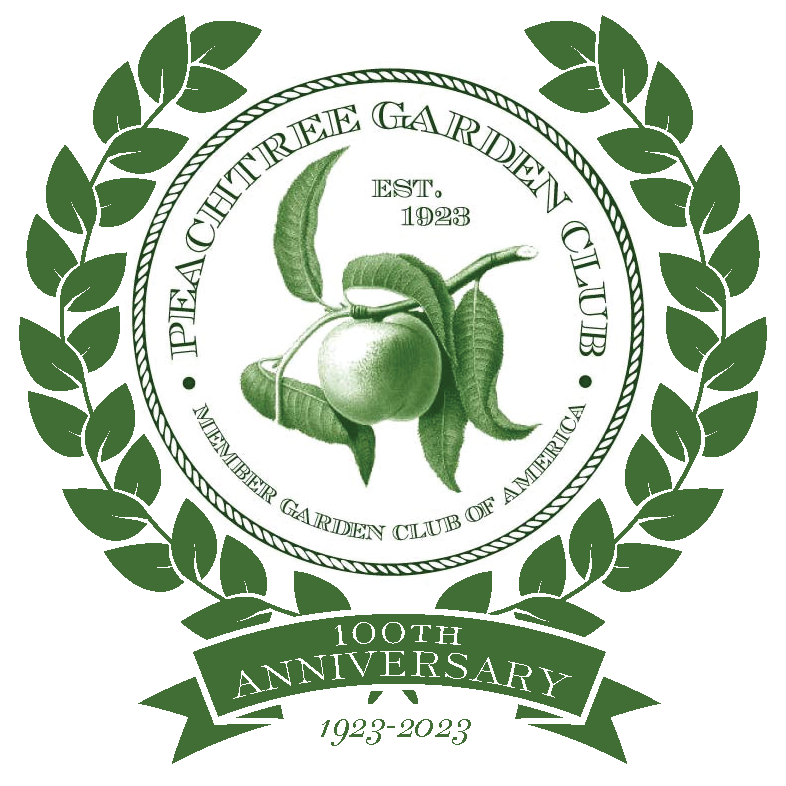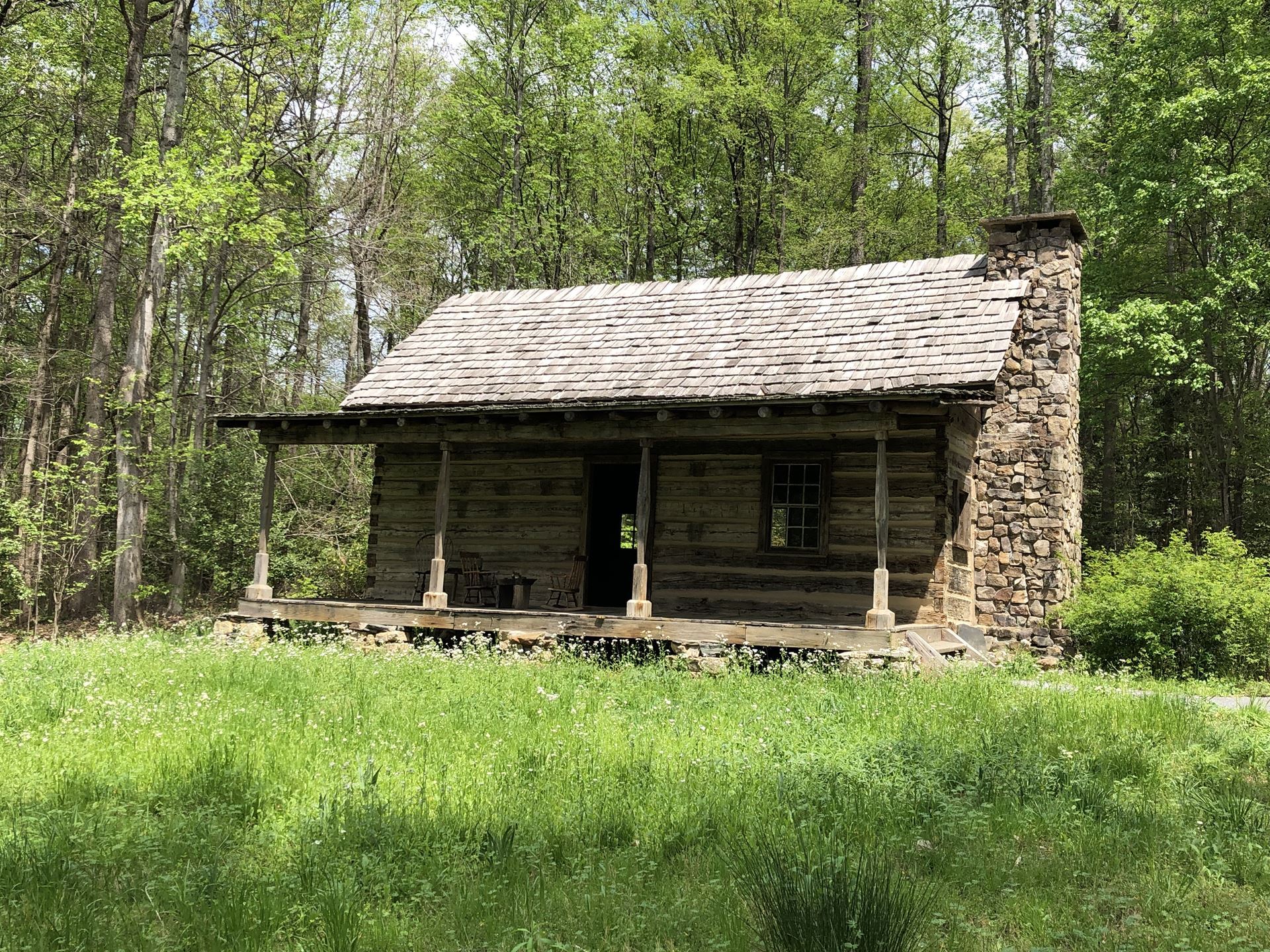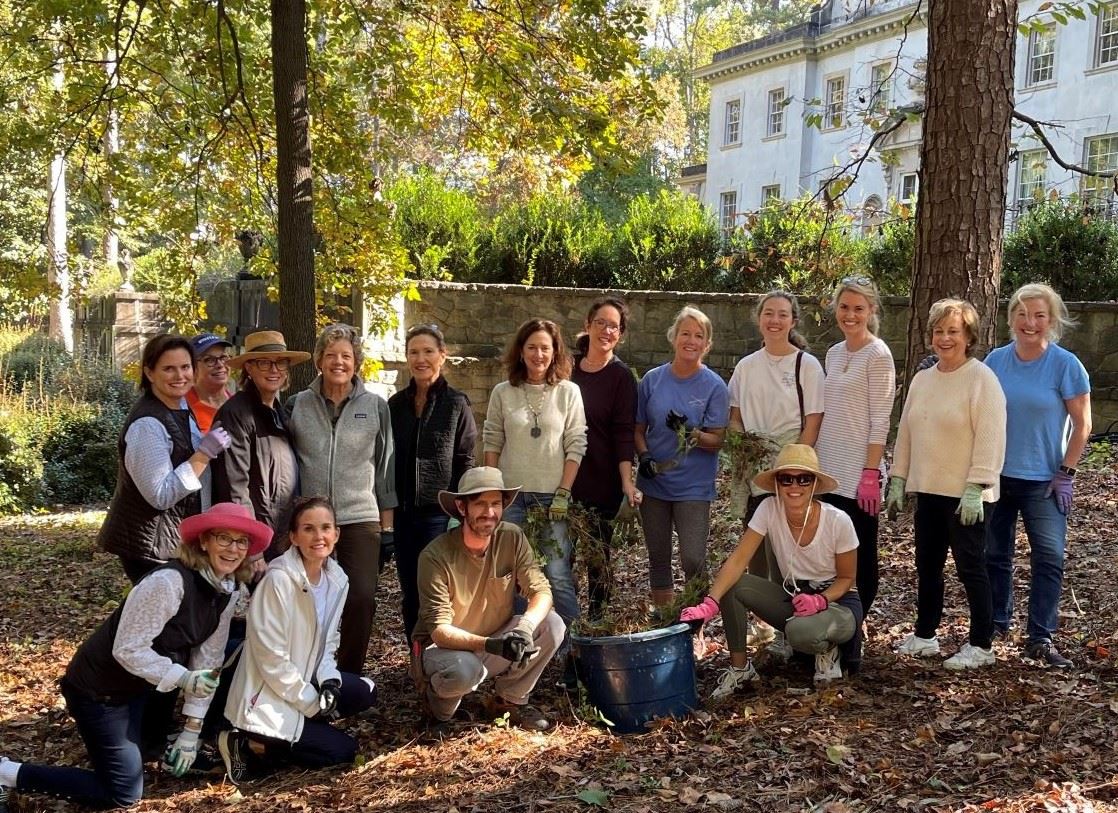swan Woods
55 Year Love Affair: Swan Woods, Atlanta
PGC members raised $500,000 in 2014 to help relocate the Wood Family Cabin to the grounds. The 1830 era log cabin is a teaching venue. PGC also helped underwrite a handicap access ramp on the grounds and was involved in the Atlanta History Center Chestnut orchard by the Cabin to nurture a hybrid with strong resistance to the chestnut blight, which nearly obliterated the American chestnut. PGC helps maintain Swan Woods on regularly scheduled workdays and continues to support it financially. PCG’s continued investment ensures that this woodland sanctuary and its programs in forest ecology and conservation will continue to thrive. Jenny Cruse Sanders, director, State Botanical Garden of Georgia, noted recently, “…Swan Woods has undergone restoration resulting from removal of non-native invasive species and establishment of native plant species…(it) is a natural resource for the public to experience a North American piedmont forest.” Members can click below to access digitized historical files and fun facts for Swan Woods |
Gardens for Peace - Swan Woods
The first garden in the international network, Gardens for Peace, was dedicated on April 22, 1988, on the Swan Woods Trail at the Atlanta History Center. This ceremony in Swan Woods was not only the first garden dedication but the first announcement of an unprecedented sculpture exchange with one of Atlanta’s sister cities Tiblisi, Georgia. Over the following 18 months, the sculpture exchange was completed. The Peace Tree, a life size bronze sculpture by artist Georgi “Gia” Japaridze, stands in the garden today! The idea for creating this network originated with a member of the Peachtree Garden Club during the Vietnam War. With the support of family, friends and community leaders Gardens for Peace, a non-profit organization, was founded in 1984. The founders believe that by promoting the concept of the garden as a place of peace and meditation the organization can contribute to the general social welfare of all, and to the elimination of tensions, discrimination and prejudice that are inconsistent with peace symbolized by the garden. Millicent Johnson and Kay Donahue, Presidents of the Garden Club of American, were among early major contributors. Marion Hill, Ray Thompson, Marilyn Obenshein and Rebecca Moore were early, energetic and faithful members! Gardens for Peace strive to make others more aware of the significance of the garden as a symbol of peace. The research upon which the criteria is based was conducted by the late Simon Downs, then a graduate student in the University of Georgia’s School of Environmental Design, under the guidance of Darrel Morrison. Simon Downs wrote, “Throughout history, man’s view of his position in the universe has been expressed through the garden. During much of this history he has been at peace neither with himself, nor with the rest of nature, but still has created gardens as sanctuaries from the rest of the world. The garden has thus become one of the most universal symbols of peace” ! Through this quiet effort Swan Woods is currently linked in this worldwide community with Madrid Botanical Gardens, Agnes Scott Alumni Garden, Lakewold Gardens, Kenya Pastoral Institute, Lay Institute of Columbia Theological Seminary, Oakhurst Community Garden, Caroline C. Black Garden of Connecticut College, Duke University’s Asian Garden, Sadako Peace Garden Montecito California, Botanical Gardens of University of Georgia, Chandor Gardens of Weatherford Texas, Cheyenne Botanical Gardens, Charlottesville Historical Society Garden, Northside Hospital Serenity Garden at Women’s Center, Seattle Community College, Emory University Baker Woodland, and South Korea Pohang Central Presbyterian Garden. Spreading peace in the world begins however slowly as we discover peace within ourselves. Swan Woods established in 1969In the shadows of Atlanta's skyscrapers sits Swan Woods, a ten-acre outdoor ecological laboratory was conserved in 1969 by the Peachtree Garden Club. This woodland hosts an amazing variety of wildlife and many native plant species. The Peachtree Garden Club received the Garden Club of America's Founders Fund Award for this project in 1969, and more recently, was awarded runner-up in GCA 2014 Founders Fund for the Wood Family Cabin project. To visit the Atlanta History Center blog page on Swan Woods Trail, click here. | Atlanta History Center/Swan Woods Fun Facts and Historical Time Line The Atlanta History Center is comprised of 33 acres with 22 acres of gardens. This is unbelievable green space for the public. Recently the surrounding fences have been taken down under the leadership of Sheffield Hale, which has made the property easily accessible to the public. 1924- The home of Emily and Edward Inman burned in Ansley park causing them to relocate. Ultimately, they purchased 28 acres in Buckhead and hired American architect Philip Trammell Shutze to build their new home. 1926 - Atlanta Historical Society was founded. 1928 - Swan House was completed. 1931- Sadly, Edward died shortly after completion. 1964 - Emily continued to live in Swan house with her family until the year of her death. 1966 - The Swan house and surrounding grounds were purchased by the Atlanta Historical Society. Deeply involved with the Society Louise Allen began reaching out to her friends for help with the maintenance of the grounds and gardens. Starting out with the local garden clubs, she contacted her friend Laura Dorsey a member of Peachtree Garden Club. 1967- Peachtree Garden Club became stewards of Swan Woods. (Almost 50 years!) Swan Woods is a 10-acre woodland of mature trees. A foundation was started by members of Peachtree Garden Club to create and oversee an endowment fund to help pay for maintenance of Swan Woods. 1969 - Garden Club of America awarded Swan Woods the Founders Fund to create an outdoor ecological laboratory, as well as the Swan Woods Trail. This land opened up a wonderful opportunity to teach school children about forests, ecology, conservation, endangered species and allowed them to simply walk woodland trails in the middle of our booming city. 1988 - The Gardens of Peace statue was installed on Swan Woods Trail. Gardens for Peace is a nonprofit organization to promote gardens as a place of meditation and peace. Our dear Peachtree member Laura Dorsey was instrumental in this endeavor. 1989 - The current Atlanta History museum was built to house the DuBose family civil war collection. Dear to the heart of member Dean Smith who grew up with this collection in her childhood home! 1990 - Atlanta Historical Society was renamed as the Atlanta History Center. 1993 - The AHC was reopened after a $15 million expansion. 1996 - Center was infused with another $11 million, which was used for further expansion. 2012 - Partnered with Atlanta Botanical Garden, Atlanta History Center, and Peachtree Garden Club, we propagated and planted rare trillium in Swan Woods. This is a wonderful example of organizations working together in the community. Most recently, Peachtree Garden Club members raised $500,000 to help fund the relocation the Wood Family Cabin to the Atlanta history center grounds and into the Swan Woods. During this time, the project was the Founders Fund runner up winner. The 1830 era log cabin was a gift from our beloved Hartrampf family, as Pat has been a long-time Peachtree Garden Club member. This cabin provides an important teaching venue in the heart of Swan Woods. Upcoming Highlights: 2018 - The newly relocated cyclorama is expected to open at the Atlanta History Center |
Conservation of Trillium at Swan Woods: A PartnershipBy Jenny Cruse Sanders, V.P. of Conservation and Research at Atlanta Botanical Garden There are more than 20 species of Trillium native to Georgia. These beautiful native wildflowers are an important part of the natural heritage of forested landscapes throughout the southeastern U.S. Several species of Trillium have become rare due to habitat loss. Piedmont forests in particular, such as those in the metro Atlanta region, have lost many of the native species of wildflowers, including Trillium, as a result of habitat fragmentation and invasion of non-native plants (English ivy, privet, and kudzu). Swan Woods at the Atlanta History Center provides a premiere example of native piedmont forest in the metro Atlanta area. Over the years Swan Woods has undergone a restoration resulting from removal of non-native invasive species and establishment of native plant species. Swan Woods is a natural resource for the public to experience a North American piedmont forest. It is a place for visitors to enjoy and learn about native plant species. This project seeks to support these objectives through establishment of Trillium populations in Swan Woods for conservation, education, and enjoyment, arid to underscore the relevance of this area for promoting harmony for people and the natural environment. This project will also build partnership between the Atlanta Botanical Garden, the Atlanta History Center, and the Peachtree Garden Club. Since 1967 the Peachtree Garden Club has promoted restoration and conservation in Swan Woods and has worked to provide important opportunities for the public and for students to experience nature in it as a 10 acre outdoor ecological laboratory. |




.jpg)